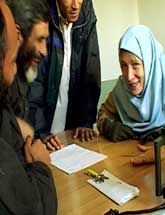Sarah Chayes is an American who went to Afghanistan in October 2001 to report on the war for National Public Radio. When the fighting — and the news assignment — was over, she sensed her responsibility was just beginning. Feeling a growing need to stop talking about conflict and start doing something about it, Chayes stayed to serve as field director of Afghans for Civil Society, a non-profit group based in Baltimore. In “Rebuilding Akokolacha,” she describes some of the tensions she experienced as an American aid worker in Afghanistan.
REBUILDING AKOKOLACHA
by Sarah Chayes
THE CHRISTIAN SCIENCE MONITOR ©2002
…[In spring 2002] the nonprofit development organization I’m helping to run appealed to the people of Concord, Massachusetts (where I gave a lecture) and others we approached personally for money to reconstruct Akokolacha’s ruined houses. The response was breathtaking — $18,000 in private donations to build a symbolic bridge between a small American town and a crippled village in Afghanistan.
By September, we’d held several “shuras” — or council meetings — with the villagers. Top of the repair list were houses rendered truly uninhabitable by the bombing — we weren’t doing cracked ceilings. The villagers wanted to start with the mosque and the house of a crotchety, feisty elder called Hajji Baba. Least popular was our decision to build standard houses for everyone: three rooms, a veranda, a kitchen, and a bathroom. The decision was a result of the impossibility of getting good-faith descriptions of the houses that had been destroyed.
At first, I was hurt and offended by the villagers’ attitude. Abdullah has remained so. He’s run rebuilding projects for 20 years and has seen boundless permutations of ingratitude, theft, and corruption. He’s bitter about those of his people he feels dishonor the rest. Akokolacha’s residents disgust him, and he shows it.
I’d been describing Afghanistan to friends as a society suffering from collective post-traumatic shock. Now I was seeing the reality behind the metaphor. For a quarter century, Akokolacha inhabitants have been deprived of a future, of the wherewithal to think ahead, to husband resources for later wise investment. Their destiny — appalling suffering or sudden bounty handed out for no apparent reason — has come down upon them arbitrarily, usually at the hand of outsiders. So what matters is right now. And the villagers were trying to leverage as much as they could get right now.
I learned to deflect their complaints and requests with bluff repartee. And so, despite some nagging internal misgivings, I informed them of the dimensions of their future standard houses at the “shura.”
Hilarious old Hajji Baba, who is toothless and wears dark glasses with one lens poked out, balked. First he insisted he didn’t want a house at all unless the rooms were seven meters long. Then he tried to bargain down to six. We’d agreed on five, and we were sticking to it. We told Hajji Baba we wouldn’t force him to have a house and we turned to someone else’s. He caved and told us to get cracking — and he was on it like a hawk, complaining and adjusting and pitching in, and cackling and throwing tantrums. Every time I’d show up, his pout would crack into a smile; he’d let me kiss his dirt-caked hand and tease him, and he’d grudgingly agree that the work was OK.
To add irony to this crash course in aid delivery, I was caught in the crossfire of Afghan and American notions of how I should be working. An independent film crew making a documentary on the Akokolacha project began questioning my attitude: Why wasn’t I more sympathetic to the villagers’ desires? Wasn’t I imposing my Western image of an Afghan village on them?
In my other ear, Abdullah was remonstrating in the opposite vein: “Why do you keep listening to these thieving villagers? Will you just let me run this job?”
Through it all, trenches were dug, and wizened stonemasons were deftly choosing pieces of rock to Rubiks-together into solid, mortarless foundations…
Excerpted from THE CHRISTIAN SCIENCE MONITOR, December 10, 2002


